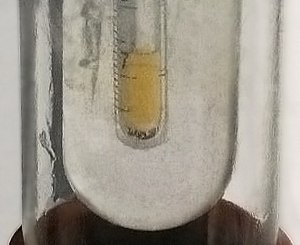What does halogen mean?
Definitions for halogen
ˈhæl ə dʒən, -ˌdʒɛn, ˈheɪ lə-halo·gen
This dictionary definitions page includes all the possible meanings, example usage and translations of the word halogen.
Princeton's WordNet
halogennoun
any of five related nonmetallic elements (fluorine or chlorine or bromine or iodine or astatine) that are all monovalent and readily form negative ions
Wiktionary
halogennoun
Any element of group 7, i.e. fluorine, chlorine, bromine, iodine and astatine, which form a salt by direct union with a metal.
Etymology: From ἅλς + -gen, referring to elements which produce a salt in union with a metal.
Wikipedia
Halogen
The halogens () are a group in the periodic table consisting of six chemically related elements: fluorine (F), chlorine (Cl), bromine (Br), iodine (I), astatine (At), and tennessine (Ts), though some authors would exclude tennessine as its chemistry is unknown and is theoretically expected to be more like that of gallium. In the modern IUPAC nomenclature, this group is known as group 17.The word "halogen" means "salt former" or "salt maker". When halogens react with metals, they produce a wide range of salts, including calcium fluoride, sodium chloride (common table salt), silver bromide and potassium iodide.The group of halogens is the only periodic table group that contains elements in three of the main states of matter at standard temperature and pressure, though not far above room temperature the same becomes true of groups 1 and 15, assuming white phosphorus is taken as the standard state. All of the halogens form acids when bonded to hydrogen. Most halogens are typically produced from minerals or salts. The middle halogens—chlorine, bromine, and iodine—are often used as disinfectants. Organobromides are the most important class of flame retardants, while elemental halogens are dangerous and can be toxic.
ChatGPT
halogen
A halogen is any of the elements in group 17 (formerly group VIIA) of the periodic table, namely fluorine, chlorine, bromine, iodine, and astatine. These elements are characterized by their high reactivity and the fact that they exist in nature as salts or other compounds rather than as pure elements. They are capable of gaining an electron to achieve a stable electron configuration and are often involved in chemical reactions as oxidizing agents.
Webster Dictionary
Halogennoun
an electro-negative element or radical, which, by combination with a metal, forms a haloid salt; especially, chlorine, bromine, and iodine; sometimes, also, fluorine and cyanogen. See Chlorine family, under Chlorine
Etymology: [Gr. "a`ls, "alo`s, salt + -gen: cf. F. halogne.]
Wikidata
Halogen
The halogens or halogen elements are a group in the periodic table consisting of five chemically related elements, fluorine, chlorine, bromine, iodine, and astatine. The artificially created element 117 may also be a halogen. In the modern IUPAC nomenclature, this group is known as group 17. The group of halogens is the only periodic table group which contains elements in all three familiar states of matter at standard temperature and pressure. All of the halogens form acids when bonded to hydrogen. Most halogens are typically produced from minerals of salts. The middle halogens, that is, chlorine, bromine and iodine, are often used as disinfectants. The halogens are also all toxic.
Chambers 20th Century Dictionary
Halogen
hal′o-jen, n. a substance which by combination with a metal forms a saline compound.—adjs. Halog′enous; Ha′loid, like sea-salt.—ns. Hal′omancy, divination by means of salt; Hal′ophyte, the salt-wort, found in salt-marshes, &c. [Gr. hals, salt, genēs, producing.]
Matched Categories
Numerology
Chaldean Numerology
The numerical value of halogen in Chaldean Numerology is: 2
Pythagorean Numerology
The numerical value of halogen in Pythagorean Numerology is: 8
Popularity rank by frequency of use
References
Translations for halogen
From our Multilingual Translation Dictionary
- halogeenAfrikaans
- الهالوجينArabic
- halogenCatalan, Valencian
- halogenCzech
- HalogenGerman
- αλογόνοGreek
- halogenoEsperanto
- halógenoSpanish
- halogeenEstonian
- halogeeniFinnish
- halogèneFrench
- halóxenoGalician
- halogénHungarian
- հալոգենArmenian
- halogenoIdo
- alogenoItalian
- ハロゲンJapanese
- halogenusLatin
- halogeenDutch
- fluorowiec, halogenPolish
- halogênioPortuguese
- halogenRomanian
- галогенRussian
- halogenVietnamese
Get even more translations for halogen »
Translation
Find a translation for the halogen definition in other languages:
Select another language:
- - Select -
- 简体中文 (Chinese - Simplified)
- 繁體中文 (Chinese - Traditional)
- Español (Spanish)
- Esperanto (Esperanto)
- 日本語 (Japanese)
- Português (Portuguese)
- Deutsch (German)
- العربية (Arabic)
- Français (French)
- Русский (Russian)
- ಕನ್ನಡ (Kannada)
- 한국어 (Korean)
- עברית (Hebrew)
- Gaeilge (Irish)
- Українська (Ukrainian)
- اردو (Urdu)
- Magyar (Hungarian)
- मानक हिन्दी (Hindi)
- Indonesia (Indonesian)
- Italiano (Italian)
- தமிழ் (Tamil)
- Türkçe (Turkish)
- తెలుగు (Telugu)
- ภาษาไทย (Thai)
- Tiếng Việt (Vietnamese)
- Čeština (Czech)
- Polski (Polish)
- Bahasa Indonesia (Indonesian)
- Românește (Romanian)
- Nederlands (Dutch)
- Ελληνικά (Greek)
- Latinum (Latin)
- Svenska (Swedish)
- Dansk (Danish)
- Suomi (Finnish)
- فارسی (Persian)
- ייִדיש (Yiddish)
- հայերեն (Armenian)
- Norsk (Norwegian)
- English (English)
Word of the Day
Would you like us to send you a FREE new word definition delivered to your inbox daily?
Citation
Use the citation below to add this definition to your bibliography:
Style:MLAChicagoAPA
"halogen." Definitions.net. STANDS4 LLC, 2024. Web. 19 Apr. 2024. <https://www.definitions.net/definition/halogen>.



Discuss these halogen definitions with the community:
Report Comment
We're doing our best to make sure our content is useful, accurate and safe.
If by any chance you spot an inappropriate comment while navigating through our website please use this form to let us know, and we'll take care of it shortly.
Attachment
You need to be logged in to favorite.
Log In